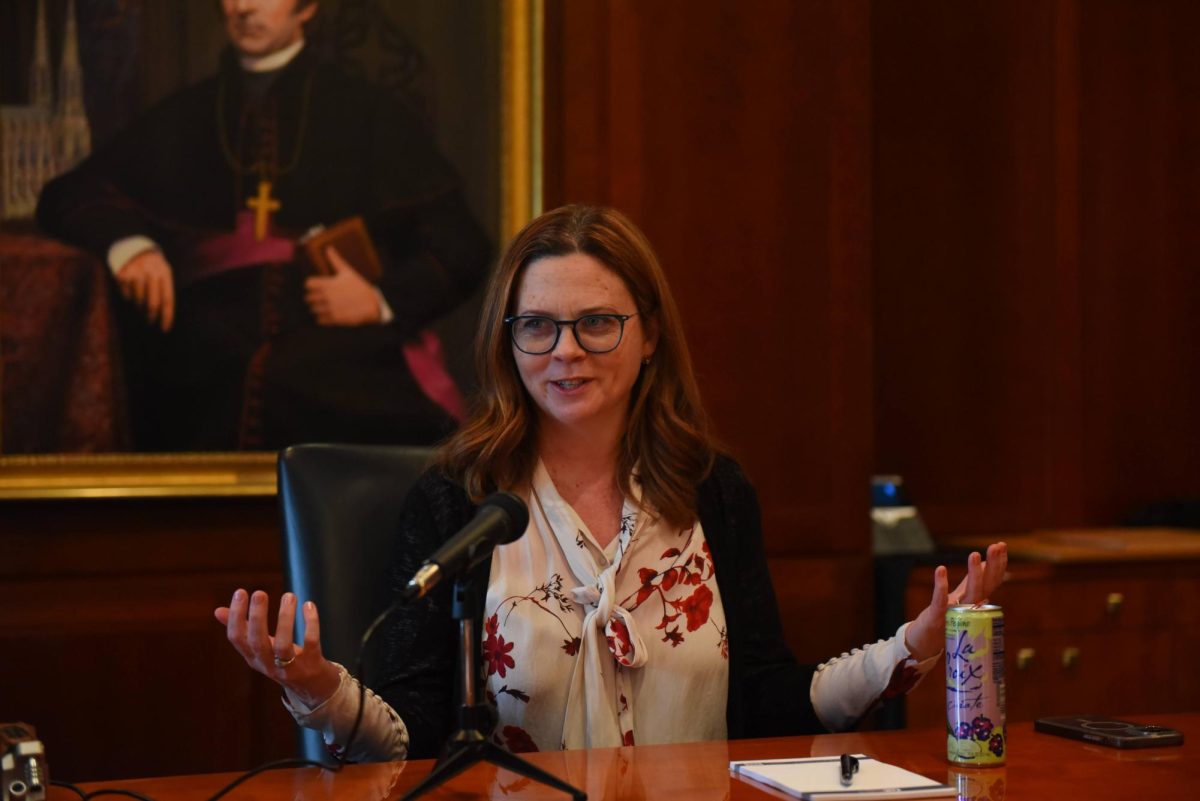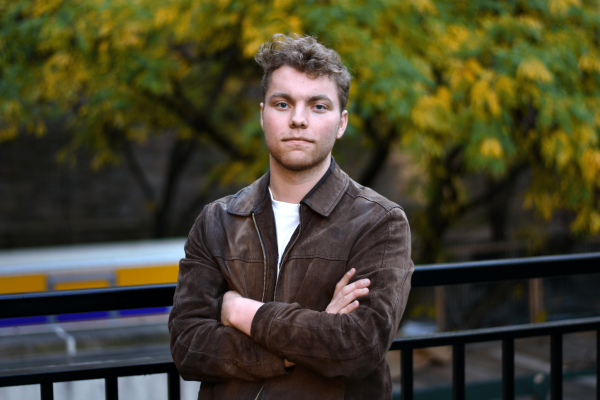For University President Tania Tetlow, her golden retriever Archie — a campus celebrity among Fordham community members — is the ultimate emotional support dog when it comes to the challenges she faces in her position. She shared that she finds herself mulling over upcoming commitments as she takes Archie on a walk.
Having been featured in a profile for The New York Times on Jan. 28, Tetlow has gained attention for her achievements as the first laywoman president at both Loyola University New Orleans and Fordham University, in addition to her former legal career as a prosecutor and her dedication to public service.
The president spoke with the university’s two undergraduate newspapers: The Fordham Observer, Lincoln Center’s publication, and The Fordham Ram, Rose Hill’s publication, in a student press conference on Feb. 27 that took place in the President’s Dining Room on the 12th Floor of the Leon Lowenstein Center. A wide array of subjects were touched on, ranging from her favorite nearby restaurants to her perspectives on how to navigate painful conversations.
Undergraduate Tuition Costs and Test Optional Policy
At the student press conference with both undergraduate publications on March 1, 2023, Tetlow announced a tuition increase would occur following two academic school years in which tuition had not been raised — later that month on March 30, 2023, the increase was noted to be 6%. At the following student press conference on Nov. 27, 2023, Tetlow added that while the cost of a collegiate education continues to “hit the ceiling for American families,” the university is not aiming to repeat the 6% increase.
According to Justin Bell, vice president for marketing and communications at Fordham, the tuition increase is projected to be announced to members of the Fordham community in mid-March. Tetlow confirmed that the increase in tuition will be “lower than before.”
“We know that the investment in a Fordham education pays off because we see the outputs of the kinds of jobs and careers that come of it — the quality of the graduate programs that you go to, especially our own, all of that,” Tetlow said.
She added that the university acknowledges how “daunting it is to borrow for education,” and although costs have risen alongside the inflation rate, she still refers back to universities hitting the ceiling for what American families can afford.
Tetlow met with members of the House of Representatives and the Senate in early February to discuss strengthening higher education policy, among them being Senate Majority Leader Chuck Schumer, U.S. Representative Ritchie Torres, who represents the Bronx, and U.S. Representative Jerry Nadler, who represents the Upper West Side of Manhattan. She noted that the meeting acted as a reminder that “public support for education opportunity keeps waning, and that is terrible for opportunity in this country.”
When it comes to the test optional policy in admissions, Tetlow noted that Fordham has “no plans to go back to testing in the immediate future.”
“I think that the research on testing being a better predictor of success is contested and mixed, and I think has been oversimplified in some recent coverage,” she said. “We believe strongly that high school GPA and a holistic application review are a better predictor of success.”
Fordham announced that it would be test-optional in May 2020 for a two-year period, leaving it to students to decide whether or not they would like to submit their standardized test scores (SAT or ACT). On Sept. 12, 2022, the policy was extended for another year to include fall 2024 applications, and on Sept. 6, 2023, the policy was extended again to include fall 2025 applications.
On Feb. 22, The New York Times broke the news that Yale University will join Dartmouth College as another Ivy League to require standardized test scores for the fall 2025 application pool.
The president noted that universities with lower acceptance rates have to take additional factors into consideration, such as standardized test scores, in order to determine which of the students from their applicant pool can be offered admission. Tetlow added that for the university, the priority in admissions is to select the “best and brightest students who will flourish here at Fordham.”
Navigating Freedom of Speech on College Campuses
When three Ivy League presidents faced the House Committee on Education and the Workforce after being called to be questioned about allegations of antisemitism on their college campuses, the conversation of freedom of speech at universities was at the forefront of students, administrators and elected officials alike.
While Claudine Gay and Elizabeth Magill — former presidents of Harvard University and the University of Pennsylvania respectively — resigned from their positions after arguing their cases and standing by their university policies in front of the House. Sally Kornbluth, president of the Massachusetts Institute of Technology, was the other university president questioned at the hearing, but she remains in her position.
While Tetlow shared that she had read about the position of a university president being the most difficult position to occupy in the current state of affairs, she joked about not knowing whether or not to feel a sense of pride or self-pity.
“These were already very complicated jobs and I think it’s very hard to navigate complexity and treacherous ground without misstepping sometimes, as some of my colleagues have done, but the sort of immediacy of consequences to that has felt in some ways — I wonder how much of that is about making higher ed a useful political football right now,” she said.
At the Church of St. Ignatius Loyola on Manhattan’s Upper East Side, Tetlow gave a speech on Feb. 14 to discuss these very topics — “Free Speech and Civility on College Campuses.” In sharing what she presented from her speech, the president highlighted that a crucial aspect to these debates was regulating the line between academic freedom, protected political speech and threats is “necessary, but very difficult.”
“I did not and do not have all the answers for these issues, but that’s some of what we’re up against,” she said. “I do think that it’s not just a question about what we’re free to yell at each other, it’s also a question of stability and it’s about trying to make a university the opposite of ‘social media land.’”
Tetlow added that she believes the university’s secret weapon is the Jesuit superpower of discernment, which dates back 500 years and, at its core, encourages the assumption of good intentions and being curious and open to other perspectives.
The president said that she intends to send out a communication to students sometime this spring and highlighted that the 2024 U.S. presidential election will also be a moment during which strong emotions will arise globally, leading to an effect at Fordham. She advised students and administrators alike to think proactively about how to make the university a place for passionate debates — ones that don’t “devolve into toxic nonsense.”
In the fall 2023 semester, Tetlow and the university administration expressed a commitment to listening to Palestinian and Jewish students, and invited students to have spaces for discourse. She added that while there have not been any conversations planned for the spring 2024 semester, she would be “eager to console the students who are in a great deal of pain, who are most affected by this war.”
Most importantly to Tetlow was highlighting her difficulty in finding the right words to comfort the student body. She shared that students share a sense of powerlessness in their eagerness for her to help, but finds herself in the embarrassing situation of revealing to them that she has less power than they imagine.
“No one’s really going to be persuaded by anything I could say to change what’s happening over there,” she said. “But that falls really flat to students who are terrified for loved ones.”
While the president said she is open to having conversations with students, she expressed that she is “not sure they are finding it as helpful as I wish it were.”
Class Sizes and Capital Projects
As of Sept. 27, 2023, the Office of Undergraduate Admissions noted in its report that the current undergraduate class size at Fordham is composed of 10,098 students. Tetlow shared that the university heavily takes into consideration what the optimal class size is when determining any growth, and that it has become harder to predict which students will accept the university’s admissions offer.
“We need to make sure we have enough physical space for you all from housing to dining, to libraries and gyms and recreation and all the rest of it,” she said.
Tetlow highlighted that one of the constraints in growing the undergraduate class size at the Lincoln Center campus is due to the space, noting the elevators in the Leon Lowenstein Center as an example of overcrowding.
Regarding capital projects at the campuses, the university is eager to construct a science building at the Rose Hill campus, with the president adding that it had been a “long time since we invested in more STEM facilities and we have urgent needs.”
According to Tetlow, the university has hired Steven J. Stainbrook as its director for university facilities planning and programming in order to determine the reorganization of some buildings on campus — the relocation of the Office of Disability Services to be more accessible to students being a notable one. She noted that construction costs for capital projects are a major consideration, and that the university is transitioning its focus between the campuses.
Insight from a Former Prosecutor
Prior to holding two positions as a university president, Tetlow received her Juris Doctor from Harvard Law School in 1995, and served as a federal prosecutor in Louisiana from 2000-05. She also shared that she operated a domestic violence clinic at Tulane Law School for 10 years, representing clients in family court.
“I used to read the paper every morning and check first and foremost to see whether any of my clients have been murdered,” she said.
Reflecting on the cases she defended as a federal prosecutor and her time at the domestic violence clinic, Tetlow shared that her experiences provided her with a sense of wanting “not just to function in broken systems but wanting to fix systems and take the time and trouble to make them better.”
She added that she feels an incredible amount of empathy toward people who face all the odds and wants to do the work to improve those odds.
Outside of the Office
In Tetlow’s first student press conference with Fordham’s undergraduate publications on Feb. 23, 2022, she had highlighted her daughter’s, Lucy, desire to be involved with her in the decision-making process.
The president shared that she will sometimes find herself seeking advice from her on work-related matters. As an 11-year-old in the sixth grade, Lucy has taught Fordham’s president tactics on how to win arguments that she found on Google as well as what Tetlow describes to be a “profound” lesson Lucy learned in middle school.
“I remember fuming about something at work,” Tetlow said. “And she said to me, without knowing any of the details, ‘So mommy, you’re gonna have to use your trash can tool’ — meaning just to throw it away, stop worrying about it, — ‘and you may have to use your forgiveness tool even if he doesn’t use his sorry tool.’”
Retrospect will publish a recording of the student press conference with narration in the coming days. Tune in to hear about topics not covered in this piece, ranging from President Tetlow’s take on the campus’ catering service, to her hopes for facilitating on-campus discourse and navigating discussions on the ongoing crisis in Gaza.
Sam Bracy contributed additional reporting to this story.
CORRECTION: A previous version of this article incorrectly referred to Dartmouth College as Dartmouth University. As of March 1, the article has been updated to refer to the institution’s name correctly.



